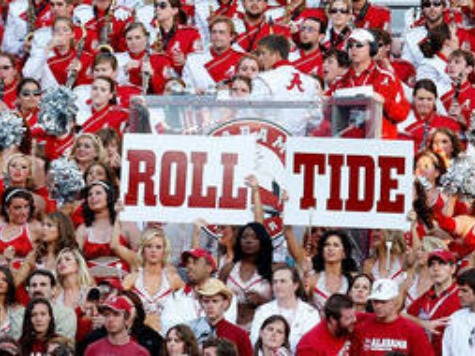Alabama vs. LSU has become college football’s top rivalry, with many calling the annual game between the two SEC powerhouses the de facto national title game. Two years ago, LSU defeated Alabama in the regular season only to lose the BCS national title game to Alabama.
If Alabama wins at home against LSU on Saturday night, Alabama fans may be wise to take extra precautions on the road, especially if the game is a thriller like last year’s contest at Death Valley in which Alabama’s T.J. Yeldon caught a screen pass from Alabama’s A.J. McCarron in the game’s final moments to seal the 21-17 comeback win. A study has “found that there were more auto-related deaths in cities where the home college and pro football and basketball teams had just won by a close margin.”
Of course, LSU could just as easily defeat Alabama, end the Crimson Tide’s undefeated season, and put Alabama’s quest for a third straight national championship in jeopardy.
According to the Wall Street Journal:
Stacy Wood, a professor of marketing at North Carolina State University, found that there were more auto-related deaths in cities where the home college and pro football and basketball teams had just won by a close margin. This was true even when controlling for the effect of alcohol consumption. (Some studies have shown that as many as 8% of fans are legally drunk after a game.)
The researchers rated the closeness of 271 games on a scale of one to five, with one being a complete blowout and five a game where the teams were neck-and-neck to the last second. The closer the game, the more auto deaths there were, Dr. Wood says. With each point the game increased on the closeness scale, there was an average 21.2% increase in traffic deaths, and a 133% increase from one to five. For every four tight games, there is an additional death near the game location, she says. Her research was published in Journal of Consumer Research in 2011.
Dr. Wood speculates that fans release more testosterone, a hormone responsible for aggression, during nail-biters. Afterward, the happy fan’s testosterone goes up while the loser’s drops.
“If you think about animals who are engaged in combat, having just won, you now feel like you could go out and continue to assert your dominance and reinforce that status and you get a bit reckless,” she says. “Losers are now slinking away to lick their wounds while they’re in that weakened state.”
Wood said she “attends N.C. State sporting events,” but “makes a point of taking her time to leave the venue until the postgame traffic has died down some, especially after Wolfpack wins.”

COMMENTS
Please let us know if you're having issues with commenting.